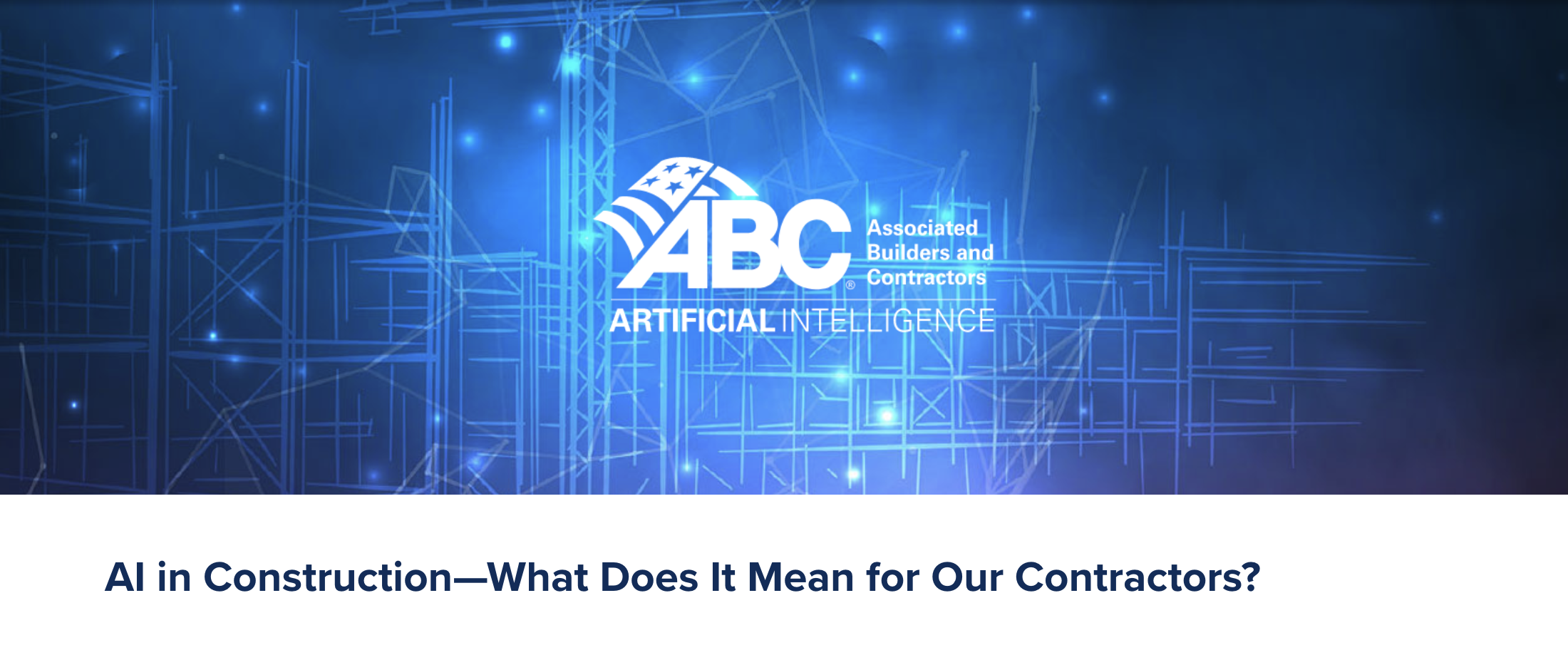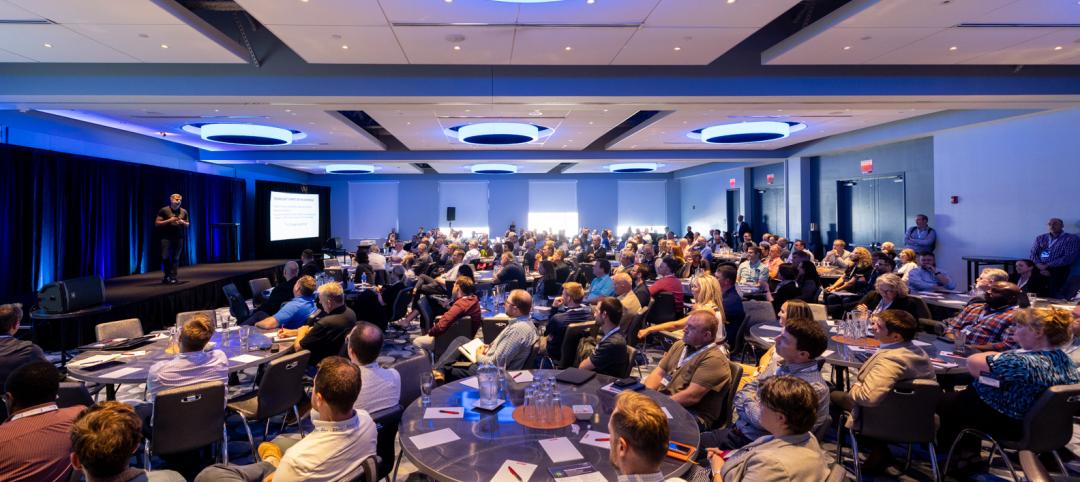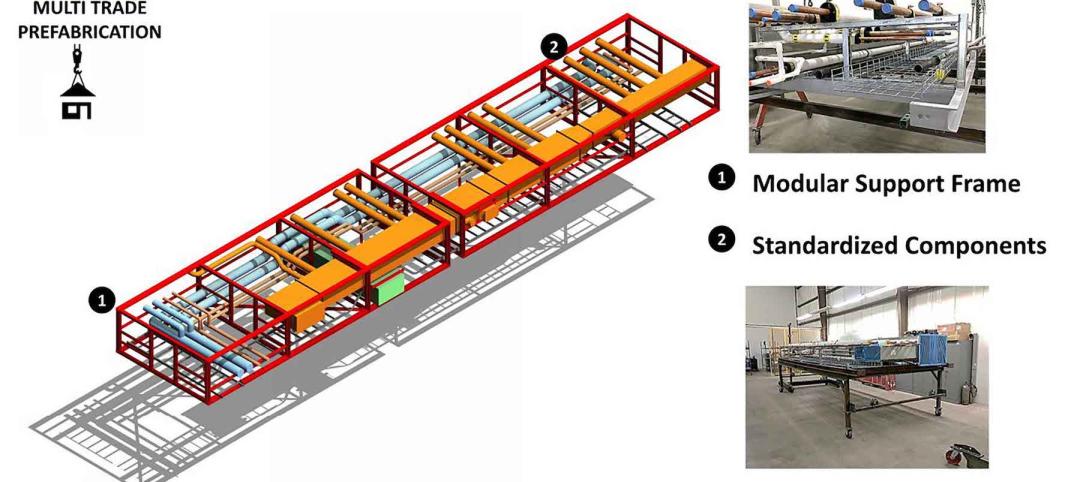Associated Builders and Contractors has released an artificial intelligence (AI) technology guide for the U.S. construction industry. AI in Construction — What Does It Mean for Our Contractors? outlines definitions, construction use cases, and considerations for the implementation of AI in construction.
“The purpose of the guide is to provide a level of knowledge to ensure contractors can be active participants in the construction AI conversation,” according to Associated Builders and Contractors.
The guide describes uses of AI during the construction project lifecycle, including preconstruction, construction, and building maintenance. It also provides definitions of terms such as deep learning and predictive AI, as well as best practices in drafting office AI policies.
“The possibilities of AI technology may sound endless, but we must first educate ourselves on the basics, and this resource is a starting point to understand AI and its potential impact on the construction industry,” said Patrick Scarpati, ABC Director of Construction Technology and Innovation. “The industry has immense opportunities to evaluate how we can better deliver projects, and we can lean on AI in achieving essential goals like upskilling, workforce development, knowledge transfer, supply chain optimization, enhanced safety design and planning, and much more.”
Use cases for AI in construction
The guide offers more than 20 uses cases and project management impacts across preconstruction, construction, and building maintenance, including:
Predictive Analytics: Analyze historical project data and current conditions to optimize construction schedules, resource allocation and task sequencing.
Supply Chain: Throughout the procurement process for self-performing contractors, artificial intelligence will empower the purchasing team to quickly identify availability and best pricing within a certain region.
Contract Review: Empower legal teams to quickly identify critical risk factors in construction contracts
Computer Vision/Intelligent Site Monitoring: Increase safety and security on jobsites. Through machine learning, video footage is trained to detect things like the number of workers entering/exiting the jobsite, workers in proximity of heavy construction machinery and even safety violations, such as the lack of face protection while saw-cutting concrete
Energy Management: Analyze energy usage patterns and optimize HVAC systems to reduce energy consumption and overall costs
Predictive Maintenance: Through the expanded use of building automation and control networks, AI can predict when building equipment is likely to fail, allowing for a proactive response.
According to ABC, “This resource is meant to act as a starting point in your journey to understand AI and its potential impact on the construction industry. By reading through definitions, construction use cases and considerations, the reader should walk away with a level of knowledge to ensure they can actively participate in future conversations on AI in construction.”
Related Stories
Airports | Aug 22, 2024
Portland opens $2 billion mass timber expansion and renovation to its international airport
This month, the Portland International Airport (PDX) main terminal expansion opened to passengers. Designed by ZGF for the Port of Portland, the 1 million-sf project doubles the capacity of PDX and enables the airport to welcome 35 million passengers per year by 2045.
AEC Tech | Aug 19, 2024
Harnessing AI to revolutionize architectural design and creativity
Architects are wondering if AI will replace us. For Vessel, the gains offset the fear. We believe there is wisdom in the unattributed quote, “You won’t lose your job to AI. You will lose your job to someone using AI.”
Energy Efficiency | Aug 9, 2024
Artificial intelligence could help reduce energy consumption by as much as 40% by 2050
Artificial intelligence could help U.S. buildings to significantly reduce energy consumption and carbon emissions, according to a paper by researchers at the Lawrence Berkeley National Laboratory.
Products and Materials | Jul 31, 2024
Top building products for July 2024
BD+C Editors break down July's top 15 building products, from Façades by Design to Schweiss Doors's Strap Latch bifold door.
Smart Buildings | Jul 25, 2024
A Swiss startup devises an intelligent photovoltaic façade that tracks and moves with the sun
Zurich Soft Robotics says Solskin can reduce building energy consumption by up to 80% while producing up to 40% more electricity than comparable façade systems.
Great Solutions | Jul 23, 2024
41 Great Solutions for architects, engineers, and contractors
AI ChatBots, ambient computing, floating MRIs, low-carbon cement, sunshine on demand, next-generation top-down construction. These and 35 other innovations make up our 2024 Great Solutions Report, which highlights fresh ideas and innovations from leading architecture, engineering, and construction firms.
AEC Tech Innovation | Jul 4, 2024
Caution competes with inevitability at conference exploring artificial intelligence for design and construction
Hosted by PSMJ, AEC Innovate in Boston found an AEC industry anxiously at the threshold of change.
Contractors | Jun 4, 2024
Contractors expect to spend more time on prefabrication, according to FMI study
Get ready for a surge in prefabrication activity by contractors. FMI, the consulting and investment banking firm, recently polled contractors about how much time they were spending, in craft labor hours, on prefabrication for construction projects. More than 250 contractors participated in the survey, and the average response to that question was 18%. More revealing, however, was the participants’ anticipation that craft hours dedicated to prefab would essentially double, to 34%, within the next five years.
AEC Tech | Apr 30, 2024
Lack of organizational readiness is biggest hurdle to artificial intelligence adoption
Managers of companies in the industrial sector, including construction, have bought the hype of artificial intelligence (AI) as a transformative technology, but their organizations are not ready to realize its promise, according to research from IFS, a global cloud enterprise software company. An IFS survey of 1,700 senior decision-makers found that 84% of executives anticipate massive organizational benefits from AI.
BIM and Information Technology | Mar 11, 2024
BIM at LOD400: Why Level of Development 400 matters for design and virtual construction
As construction projects grow more complex, producing a building information model at Level of Development 400 (LOD400) can accelerate schedules, increase savings, and reduce risk, writes Stephen E. Blumenbaum, PE, SE, Walter P Moore's Director of Construction Engineering.

















